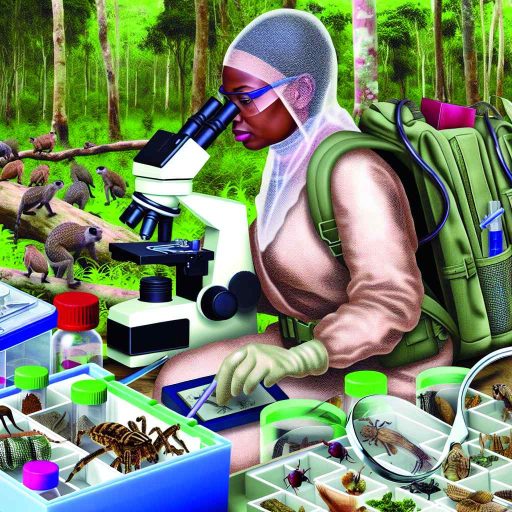Introduction
Environmental biology in Nigeria focuses on the study of interactions between organisms and their environment.
Government policies play a crucial role in promoting sustainability and conservation of natural resources.
- Environmental biology in Nigeria focuses on the study of interactions between organisms and their environment.
- Government policies play a crucial role in promoting sustainability and conservation of natural resources.
Evolution of Environmental Policies in Nigeria
Environmental policies in Nigeria have evolved over the years to address the growing concerns of environmental degradation and biodiversity loss.
The government has recognized the importance of sustainable development and the need to protect the environment for future generations.
Key Milestones in Environmental Policy Development
- The first environmental policy initiative in Nigeria was the National Conservation Strategy for Nigeria, developed in 1981.
- In 1988, the Federal Environmental Protection Agency (FEPA) was established to coordinate environmental management in the country.
- The Environmental Impact Assessment Act was enacted in 1992 to regulate the impacts of development projects on the environment.
- The National Environmental Standards and Regulations Enforcement Agency (NESREA) was created in 2007 to enforce environmental standards.
Regulations Implemented Over the Years
- The Harmful Waste (Special Criminal Provisions, etc.) Act was passed in 1988 to regulate the disposal of hazardous waste.
- The National Policy on Environment was adopted in 1989 to guide environmental management in Nigeria.
- The National Environmental (Sanitation and Waste Control) Regulations were introduced in 2009 to address waste management issues.
- The Climate Change (Establishment, etc.) Act was enacted in 2017 to tackle climate change impacts in Nigeria.
The history of environmental policies in Nigeria reflects a gradual shift towards more comprehensive and inclusive regulations to protect the environment and promote sustainable development.
Government Policies on Environmental Biology in Nigeria
In Nigeria, there are several government policies and initiatives in place to protect the environment and promote environmental biology.
These policies aim to address various environmental issues such as deforestation, pollution, and wildlife conservation.
Existing Policies and Initiatives
-
National Environmental Standards and Regulations Enforcement Agency (NESREA):
NESREA is the government agency responsible for enforcing environmental laws and regulations in Nigeria.
It monitors and regulates activities that have the potential to impact the environment negatively.
-
National Environmental Policy:
The National Environmental Policy provides a framework for sustainable environmental management in Nigeria.
It outlines the government’s commitment to protecting the environment and promoting sustainable development.
-
Environmental Impact Assessment (EIA) Act:
The EIA Act requires that any proposed project likely to have a significant impact on the environment undergo an environmental impact assessment.
This is aimed at ensuring that development projects are carried out in an environmentally responsible manner.
Laws and Regulations related to Environmental Biology
-
Endangered Species (Control of International Trade and Traffic) Act:
This Act prohibits the trade and trafficking of endangered species in Nigeria.
It aims to protect endangered species from exploitation and extinction.
-
Forestry Law:
The Forestry Law regulates the exploitation and management of forest resources in Nigeria.
It aims to prevent deforestation and promote sustainable forestry practices.
-
Harmful Waste (Special Criminal Provisions, etc.) Act:
This Act addresses the handling and disposal of harmful waste in Nigeria.
It imposes criminal penalties on individuals or companies that pollute the environment with harmful waste.
-
National Parks Service Act:
The National Parks Service Act establishes and regulates national parks in Nigeria.
It aims to conserve biodiversity and protect natural habitats within the national parks.
Nigeria has made significant progress in formulating and implementing government policies on environmental biology.
These policies are essential for protecting the environment, conserving biodiversity, and promoting sustainable development in the country.
It is crucial for the government to continue enforcing these policies effectively to ensure a healthy and thriving environment for future generations.
Learn More: Prominent Nigerian Applied Botanists to Know
Challenges in Implementing Environmental Policies in Nigeria
Implementing environmental policies in Nigeria faces several challenges.
Lack of enforcement mechanisms exists.
Many environmental regulations exist but are not effectively implemented due to weak enforcement.
Corruption at various levels hinders proper enforcement.
Insufficient resources also play a significant role.
Limited financial and human resources hinder the government from effectively enforcing environmental policies.
Lack of public awareness complicates matters.
Many people in Nigeria are unaware of the importance of environmental conservation.
Inadequate infrastructure is another challenge.
Poor infrastructure limits the effective implementation of environmental policies.
Political interference leads to inconsistencies.
Political interests sometimes override environmental concerns.
Inadequate monitoring and evaluation exist as well.
Lack of proper monitoring mechanisms makes it challenging to assess the effectiveness of policies.
Resistance from industries poses additional difficulties.
Some industries resist complying with regulations due to concerns about costs and competitiveness.
Capacity constraints limit enforcement.
Government agencies often lack the capacity and expertise needed.
Legal loopholes create further problems.
Ambiguities in environmental laws undermine enforcement efforts.
Addressing these challenges requires concerted efforts.
Strengthening enforcement mechanisms is crucial.
Increasing public awareness can help improve compliance.
Allocating more resources to the environmental sector is necessary.
Closing legal loopholes is also important.
Collaboration between stakeholders is essential.
Effective collaboration can help overcome obstacles.
Ensuring sustainable environmental management benefits future generations.
Delve into the Subject: Career Opportunities in Applied Microbiology Nigeria
Transform Your Career with Expert Guidance
Get personalized mentorship consulting that’s tailored to your unique path. Our expert advice is actionable and exclusive.
Get StartedImpact of Government Policies on Environmental Biology
Government policies play a crucial role in shaping the environmental landscape of a country.
In Nigeria, policies on environmental biology have the potential to drive positive change and ensure the sustainable management of natural resources.
Effectiveness of Current Policies
Currently, Nigeria has several policies in place to address environmental issues related to biology.
These policies aim to protect ecosystems, biodiversity, and natural habitats.
However, the effectiveness of these policies in achieving their goals is debatable.
One of the main challenges is the enforcement of existing policies.
While Nigeria has comprehensive environmental laws, implementation and enforcement remain weak.
This gap often leads to loopholes that allow for illegal activities such as deforestation, poaching, and pollution to persist.
Additionally, there is a lack of coordination among government agencies responsible for environmental management.
This lack of synergy hampers efforts to address cross-cutting issues and achieve holistic solutions.
Positive Outcomes and Areas for Improvement
Despite these challenges, there have been some positive outcomes resulting from government policies on environmental biology in Nigeria.
For instance, the establishment of protected areas and national parks has helped to conserve biodiversity and wildlife habitats.
Furthermore, government interventions such as reforestation programs and pollution control measures have contributed to the restoration of degraded ecosystems and the improvement of air and water quality.
However, to enhance the impact of government policies on environmental biology, several areas for improvement need to be addressed.
- Strengthening enforcement mechanisms: Investing in training and capacity building for law enforcement agencies to ensure compliance with environmental laws.
- Enhancing public awareness: Educating the public on the importance of environmental conservation and the role they play in protecting natural resources.
- Promoting sustainable practices: Encouraging the adoption of eco-friendly technologies and practices in industries and agriculture to reduce environmental impact.
- Improving coordination: Enhancing collaboration among government agencies, NGOs, and local communities to address environmental challenges collectively.
- Incorporating indigenous knowledge: Recognizing and integrating traditional knowledge and practices of local communities into environmental management strategies.
Government policies on environmental biology in Nigeria have the potential to drive positive change and ensure sustainable environmental management.
By addressing existing challenges and focusing on areas for improvement, Nigeria can enhance the effectiveness of its policies and achieve greater success in environmental conservation efforts.
Explore Further: Overview of Applied Geology Curriculum in Nigeria

When it comes to environmental conservation in Nigeria, the role of stakeholders is crucial in shaping government policies and ensuring the protection of natural resources.
Collaborating with various sectors such as the government, private sector, and communities is essential for effective environmental management.
Importance of Collaboration
- Government: Setting regulatory frameworks and enforcing environmental laws.
- Private Sector: Implementing sustainable practices and investing in green technologies.
- Communities: Participating in conservation efforts and raising awareness.
By working together, stakeholders can address environmental challenges more effectively and achieve long-term sustainability goals.
The synergy between the government, private sector, and communities can lead to innovative solutions and successful conservation initiatives.
Role of NGOs and Advocacy Groups
- NGOs: Play a vital role in monitoring environmental issues and providing expertise.
- Advocacy Groups: Advocate for policy changes and raise public awareness on environmental issues.
NGOs and advocacy groups act as watchdogs, holding the government accountable for their environmental policies and actions.
They provide valuable input based on research and promote sustainable practices through advocacy campaigns and community engagement.
Furthermore, NGOs and advocacy groups serve as bridges between the government and the public, facilitating dialogue and collaboration on environmental topics.
Their efforts contribute to shaping policies that are environmentally friendly and ensure the conservation of biodiversity and ecosystems.
Collaborative Efforts for Sustainable Development
The role of stakeholders, including the government, private sector, communities, NGOs, and advocacy groups, is integral in environmental conservation in Nigeria.
Collaborative efforts and partnerships among these stakeholders are essential for driving positive change and promoting sustainable development practices.
Learn More: Top Nigerian Universities Offering Ecology Programs
Impact of Government Policies on Environmental Biology
Government policies play a crucial role in shaping environmental biology in Nigeria.
These policies guide research, conservation efforts, and sustainable practices.
By enforcing regulations and providing incentives, the government can drive positive change in the field of environmental biology.
The significance of these policies in advancing environmental biology cannot be overstated.
They create a framework for addressing environmental challenges, protecting biodiversity, and promoting sustainable development.
Additionally, these policies help educate the public about environmental issues.
They encourage active participation in conservation efforts.
Government policies serve as a cornerstone for building a harmonious relationship between humans and the environment.
Through strategic planning and implementation, Nigeria can leverage its natural resources while safeguarding them for future generations.
It is imperative for policymakers to continue prioritizing environmental protection and sustainability.
This will ensure a healthy and resilient ecosystem for all living organisms.
Additional Resources
Nigeria Chapter – Society for Conservation Biology
Identifying system archetypes in Nigeria’s rice agri-food system …




